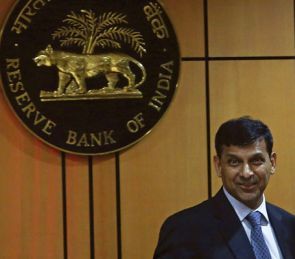 Surging vegetable prices led wholesale price inflation to a 14-month high in November, reinforcing expectations the Reserve Bank of India will have to raise interest rates again this week at a time the country's economy is flagging.
Surging vegetable prices led wholesale price inflation to a 14-month high in November, reinforcing expectations the Reserve Bank of India will have to raise interest rates again this week at a time the country's economy is flagging.
Policymakers have been grappling with high prices for food staples such as onions and potatoes even after the central bank raised interest rates by a quarter percentage point in each of its previous two reviews.
The struggle to beat inflation, despite good monsoon rains this year, shows how the country is suffering from longstanding problems with infrastructure and supply chains.
High food prices are also becoming a major headache for an embattled government facing elections by May next year.
That has saddled the RBI with the difficult task of having to raise interest rates in an economy growing at its slowest pace in a decade, which threatens to further undermine confidence among businesses and investors.
High inflation "means the RBI has to hike rates or lose credibility," said Dariusz Kowalczyk, senior economist for Asia ex-Japan at Credit Agricole in Hong Kong.
"Rate hikes will not correct food prices," he added.
"The hawkish intention is a mistake, in our view, and will lead to slower growth."
The wholesale price index climbed 7.52 per cent in November from a year earlier, its quickest pace since September 2012, compared with 7 per cent in October, the Commerce and Industry Ministry said on Monday.
A Reuters' poll of economists had predicted annual headline inflation of 7 per cent last month.
The data confirms the pernicious impact of food prices, as shown last week when the government said consumer prices rose at their fastest annual pace on record in November, 11.24 per cent from October's 10.17 per cent.
Monday's data showed the food price index shot up 19.93 per cent in November from a year earlier, the biggest rise since June 2010.
At times, high food prices have brought down governments, and they were seen as a major factor behind the drubbing suffered by the Congress party in state elections held during the past month.
Rising rates
The data on Monday buttresses market expectations the RBI will raise its benchmark interest rate another quarter percentage point to 8.0 per cent at its policy review on Wednesday.
Further hikes are likely to depend on the course of inflation, given vegetable prices are expected to start coming down this month, according to analysts.
Wholesalers have confirmed that supplies of onions are increasing in the main producer states.
"While food inflation has been the key driver, the forward guidance by RBI would remain biased towards anchoring inflationary expectations and monitoring the food price trajectory," said Upasna Bhardwaj, an economist at ING Vysya Bank in Mumbai.
A new quarter-point rate hike would mean RBI Governor Raghuram Rajan, who took over in September, has undone the 75 basis points of cuts made this year by his predecessor Duvvuri Subbarao.
Last week, Rajan said that in an environment of high inflation and low growth -- which some analysts say resembles stagflation -- the central bank has to make trade-offs as it carefully calibrates monetary policy.
Data last week showed industrial production output shrank 1.8 percent year-on-year in October, dampening sentiments after recent gross domestic product data had suggested the economy may have bottomed out.
Rajan's steering of monetary policy will be made all the more difficult because of uncertainty about when the Federal Reserve will start withdrawing its monetary stimulus.
The US central bank concludes a two-day meeting on Wednesday Washington time, following the RBI's policy review.
Any tapering could again roil Indian markets after similar fears that foreign investors would exit the country sent the rupee to a record low in late August.
Still, India is widely seen as being in a far better position than a few months ago after recent measures to clamp down on gold imports and help banks raise money overseas aided substantially in narrowing its record current account deficit.
The RBI has already rolled back most of its emergency steps taken in July and August to prop up the weak rupee, which included a special dollar window for oil importers.
The only step left is a cap on how much banks can borrow from a central bank funding window.
Rajan has said repeatedly the central bank will remain flexible to tackle any renewed uncertainties.
Image: RBI Governor Raghuram Rajan
(Additional reporting by Rajesh Kumar Singh in New Delhi and Mumbai markets team)












 © 2025
© 2025